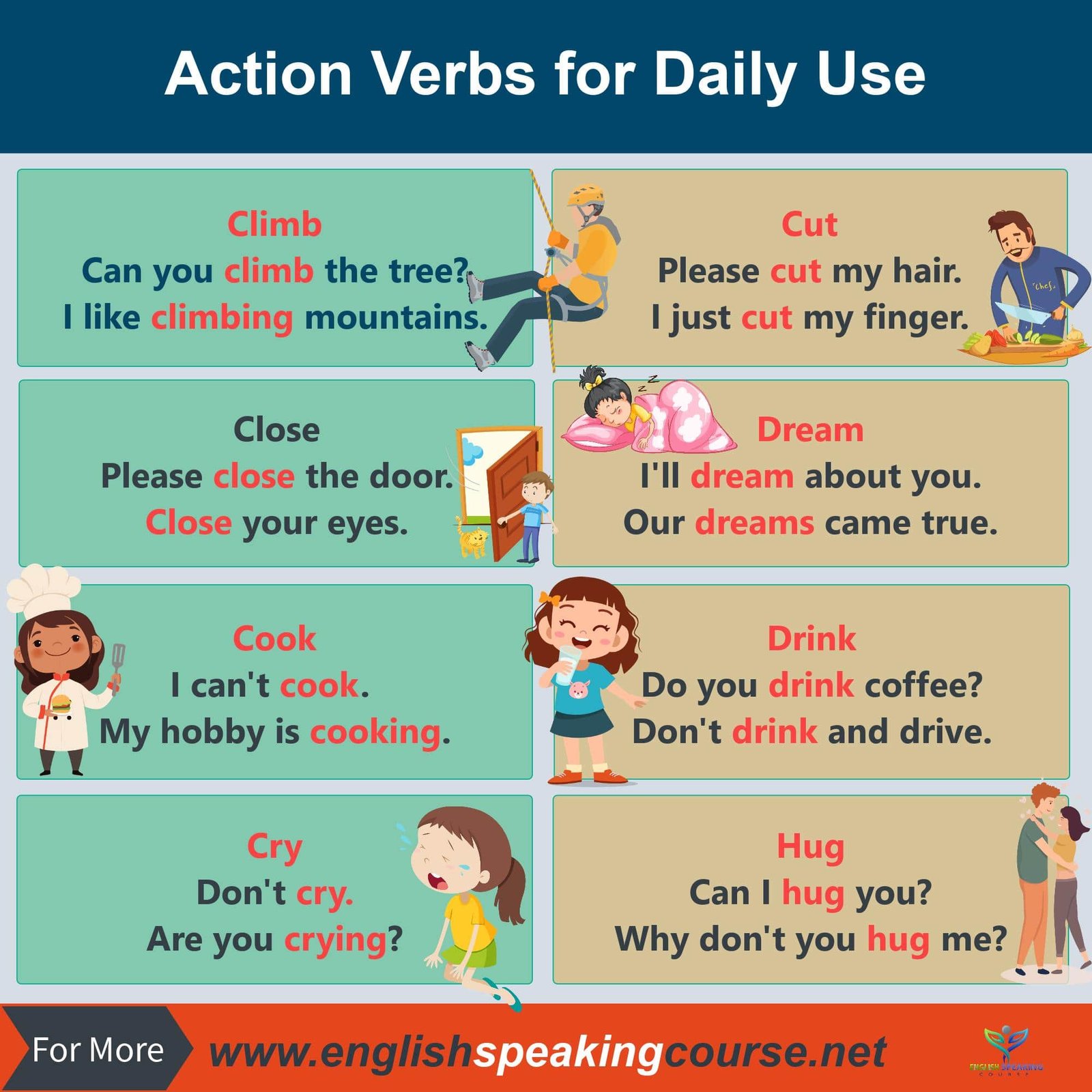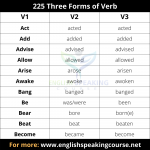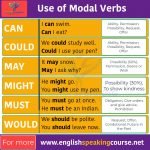Table of Contents
ToggleWhat Are Action Verbs?
If you’re trying to learn English and want to speak more confidently, understanding action verbs is a great place to start. These simple yet powerful words help you describe what someone is doing. Whether you’re saying “I eat”, “She runs”, or “They work”, you’re already using action verbs!
In this beginner-friendly guide, we’ll explore what action verbs are, how they work, and how you can use them in daily English conversations. Plus, we’ll share a few helpful tools like Spoken English Books for Beginners that can support your learning journey.
🟨 What Are Action Verbs?
Let’s keep it simple. An action verb is a word that shows an action. It tells us what a person, animal, or thing is doing.
Here are a few easy examples:
- I eat breakfast at 8 AM.
- She writes in her notebook.
- They play cricket every weekend.
All the bold words above are action verbs. They show what someone is doing — eat, write, and play.
If you’re sitting at your study desk right now, you’re already doing something: maybe reading this article or learning a new word — those are actions too!
📌 Tip: Want to learn faster? Set up a distraction-free study space with a comfortable study chair and a good study lamp to keep you focused and alert.
🟨 Why Are Action Verbs Important in Spoken English?
Imagine trying to speak without using action words. Your sentences would feel incomplete.
Compare these:
- “I breakfast.” ❌
- “I eat breakfast.” ✅
The first one doesn’t make sense. The second one clearly shows what you’re doing. Action verbs give life to your sentences. They help you describe actions, daily activities, and express yourself clearly.
Here are a few everyday uses:
- “He drinks tea every morning.”
- “We walked to the market.”
- “They will visit us tomorrow.”
Whether you’re talking about the present, past, or future — you’ll always need action verbs to form proper sentences.
If you’re trying to improve your speaking fluency, you can also practice using these verbs with the help of English Conversation Practice Books. These books provide real-life sentence examples and help you build confidence day by day.
🔗 Explore More English Grammar Topics:
What Are Action Verbs?
Let’s keep it easy.
Action verbs are words that show what someone or something is doing. They tell us about an activity or movement.
You don’t need to remember any grammar rules to understand this — just think of any action you do in a day, like walking, eating, talking, or reading. All these are action verbs!
👉 If you can say, “I am ___(doing something)”, then the word you fill in is usually an action verb.
✅ Simple Examples of Action Verbs:
- I eat rice.
- You run fast.
- She writes in her notebook.
- They sing well.
- We cook dinner together.
All the bold words — eat, run, write, sing, and cook — are action verbs. They describe what the subject (I, you, she, etc.) is doing.
💡 Study Tip: Keep a daily list of new action verbs you learn. If you’re someone who likes to study from books, a book holder or reading stand can make it easier to read hands-free while practicing aloud.
Why Are Action Verbs Important?
If you want to speak English clearly and confidently, action verbs are your best friends. Why? Because they help your sentences make sense.
Think about this:
What happens if you remove the action from a sentence?
- “I dinner.” ❌ (Not clear)
- “I eat dinner.” ✅ (Now it’s clear)
Without the word eat, we don’t know what “I” is doing. That little verb adds meaning. So, action verbs are important because they show the action — they help people understand what you’re doing, what someone else did, or what might happen.
🗣️ Action Verbs Make Your Speech Come Alive
Whenever you want to describe something you or someone else is doing — walking, sleeping, watching, playing — you need an action verb. Without them, most sentences feel incomplete.
Here are a few more examples:
- “She reads every night.”
- “They played football yesterday.”
- “We will travel next week.”
All these sentences work because they include an action verb. Even the shortest sentences need one.
🎧 Learning Tip: Try saying these sentences out loud using a Bluetooth speaker or earphones while playing spoken English videos. Repeating after native speakers helps you speak more naturally.
So remember: If you’re building a sentence in English, you’ll almost always need an action verb — it’s what gives your sentence power and purpose!
Common Action Verbs Used in Daily Life
To speak English fluently, you don’t need to memorize hundreds of verbs. Just start with the most common action verbs that you use every day — at home, school, work, or while traveling.
Here’s a simple and helpful list to get you started:
🏠 At Home
Verb | Example Sentence |
cook | I cook dinner every day. |
clean | She cleans the room. |
wash | I wash my clothes. |
sleep | They sleep early. |
eat | We eat together. |
🏫 At School or While Studying
Verb | Example Sentence |
read | I read my English book. |
write | He writes in his notebook. |
learn | We learn new words every day. |
study | She studies in the evening. |
answer | I answer all the questions. |
🪑 Study Hack: Create a comfy study space with a desk organizer and a laptop table to keep your books and devices in place. It helps you stay focused during learning time!
💼 At Work or Office
Verb | Example Sentence |
type | I type emails at work. |
call | He calls the client. |
send | She sends the report. |
meet | We meet every Monday. |
help | They help each other. |
✈️ While Traveling or Outside
Verb | Example Sentence |
go | I go to the market. |
walk | We walk to school. |
drive | He drives to work. |
visit | They visit their grandparents. |
shop | I shop on weekends. |
These are verbs you can use in daily life, even for the most basic conversations. Practice speaking them in short sentences, just like the examples above. You don’t need to be perfect — just keep practicing.
Speaking Tip: If you want to improve your pronunciation, try recording your voice using a microphone and play it back. It helps you hear how you sound and where to improve.
How to Use Action Verbs in Sentences
Now that you know what action verbs are, let’s learn how to use them in real sentences.
Don’t worry — you don’t need to learn complicated grammar rules. Just remember this easy formula:
✅ Subject + Action Verb + Object
Let’s break that down:
- Subject = who is doing the action
- Action Verb = what they are doing
- Object = who or what receives the action
✅ Example:
- She reads a book.
(She = subject, reads = action verb, a book = object)
That’s it! Simple, right?
🔁 Let’s See More Examples:
🔸 Present Tense (Now):
- I eat rice.
- He plays football.
- They watch TV.
🔸 Past Tense (Yesterday/Before):
- I ate rice.
- He played football.
- They watched TV.
🔸 Future Tense (Tomorrow/Later):
- I will eat rice.
- He will play football.
- They will watch TV.
👉 Notice how the action verb changes a little depending on the tense — that’s okay! As a beginner, start with present tense and then slowly learn past and future.
❗ Common Mistakes to Avoid
🔸 Mistake 1: Missing the action verb
❌ I breakfast.
✅ I eat breakfast.
✅ Tip: Always include the action in your sentence. Without it, the sentence feels incomplete.
🔸 Mistake 2: Wrong verb form
❌ He play football.
✅ He plays football.
🔁 Fix: In present tense, if the subject is he, she, it, add -s or -es to most action verbs.
📝 Need a place to write and practice? A good study lamp and comfortable study chair can help you stay focused and practice daily with ease!
🎯 Final Thought for This Section:
Start building your own simple sentences using action verbs. Use the formula:
I + [Action Verb] + [Object]
Try:
- I write notes.
- I watch English videos.
- I learn one new word every day.
Keep practicing, and it will soon feel natural!

Action Verbs with Simple Sentences
Dance
– Do you like to dance?
Dig
– They dig a small hole in the sand.
Dive
– He knows how to dive.
Dream
– I’ll dream about you.
– Our dreams came true.
Drink
– Do you drink coffee?
– Don’t drink and drive.
Eat
– Can I eat this?
– Have you eaten?
Fight
– Don’t fight with me.
– I won’t fight with you.
Fly
– Let’s fly a kite.
– This bird can’t fly.
Give
– Give me a sign.
– Give me a reason.
Hug
– Can I hug you?
– Why don’t you hug me?
Jump
– Jump as high as you can.
Knit
– She knit him a sweater.
Laugh
– Don’t laugh at me.
– Everybody laughed at me.
Listen
– Listen carefully to what I say.
– I tried to listen to him carefully.
Read
– Didn’t you read the book?
– He can read English easily.
Ride
– I’ll ride my bike.
– I can ride a horse.
Sew
– Do you know how to sew?
– Did you sew this by hand?
Shake
– Can I shake your hand?
– Don’t shake the table.
Sit down
– Please sit down for a while.
– Let’s sit down and have a rest.
Sleep
– Where do I sleep?
– Let me sleep on it.
Smell
– Can you smell it?
Snore
– He was snoring loudly.
– What should I do if my wife snores?
Stand up
– Will you stand up for me?
– You can stand up for your right.
Talk
– Who do you want to talk to?
– Can I talk to you for a minute?
Think
– Do you think I’m fat?
– Do you think it’s my fault?
☕ Tip: While practicing English, keep a cup of coffee beside your study lamp for a cozy learning session!
Practice Time – Try These Sentences Yourself
Let’s put what you’ve learned into action! Below are some fun and simple exercises to help you practice action verbs.
All you have to do is fill in the blanks with the correct action verb. Try to guess the answer before looking below!
✍️ Fill in the blanks with the right action verb:
- I _______ dinner every night.
- She _______ her homework.
- They _______ to music.
- We _______ football after school.
- He _______ in the office.
- You _______ very well.
- The baby _______ all day.
- I _______ a letter to my friend.
- They _______ to the market.
- She _______ a new book.
- We _______ early in the morning.
- He _______ the dishes after lunch.
- I _______ English every day.
- The teacher _______ questions.
- You _______ your bag on the table.
✅ Answers:
- I cook dinner every night.
- She does her homework.
- They listen to music.
- We play football after school.
- He works in the office.
- You sing very well.
- The baby sleeps all day.
- I write a letter to my friend.
- They go to the market.
- She reads a new book.
- We wake up early in the morning.
- He washes the dishes after lunch.
- I learn English every day.
- The teacher asks questions.
- You put your bag on the table.
📚 Practice Tip: Use a Spoken English Book for Beginners to find more examples and exercises like this. It’s a great way to improve your vocabulary and build confidence step by step.
Extra Tips to Remember Action Verbs
You’ve learned what action verbs are, how to use them, and practiced them too — well done! 🎉
Here are some extra tips to help you remember and use action verbs more confidently in real life:
🎴 1. Use Flashcards
Write simple action verbs on flashcards. On one side, write the verb (like “cook”), and on the other side, write a sentence (like “I cook dinner.”). Review them daily for just 5 minutes. This is a fun way to memorize and repeat verbs.
You can even stick flashcards on your wall, desk, or cupboard — wherever you study. And if you want to organize your learning space, try a handy desk organizer to keep everything neat and easy to find!
🗣️ 2. Speak Aloud to Practice
Speaking is key to learning. Say sentences out loud, like:
- “I eat breakfast.”
- “She reads a book.”
- “We play games.”
Record yourself on your phone or use a microphone to hear how you sound. Speaking aloud builds confidence and improves pronunciation.
📱 3. Use Apps or Smart Tools
You can use apps like Hello English, Duolingo, or even Google Assistant or Alexa to practice speaking.
For example, if you have a Smart Speaker like Alexa, try saying:
“Alexa, help me learn English.”
It’s fun, hands-free, and very helpful!
🔗 4. Learn Through Daily Practice
Start using action verbs in your real-life conversations. The more you use them, the more natural they’ll feel.
👉 Check out our related post:
📌 100 Daily English Sentences with Bengali Meaning – Practice speaking with real-life sentence examples!
🎯 Final Tip:
Don’t stress about being perfect. Speak slowly, speak clearly, and most importantly — keep speaking! Action verbs are the building blocks of English conversation, and now, you know how to use them.
You’ve got this. Keep going! 💪
Conclusion
Now that you know how to use action verbs, try using them every day in your conversations. These simple words — like eat, play, go, and write — help you express actions clearly and make your English sound natural and confident.
Remember:
- Action verbs show what someone is doing.
- They are used in almost every sentence.
- You can start with basic ones from daily life — and grow your vocabulary from there.
Learning action verbs is one of the easiest and most powerful steps you can take to improve your spoken English. Start small, keep practicing, and soon you’ll be speaking with more clarity and confidence.
📌 Tip: Use tools like flashcards, practice books, or a Spoken English Book for Beginners to make learning even easier and more fun!
💬 Got a question about action verbs?
Drop your doubts or comments below — I’d love to help you!
🗣️ Which action verb do you use most in your daily life?
Share in the comments and let’s practice together!




